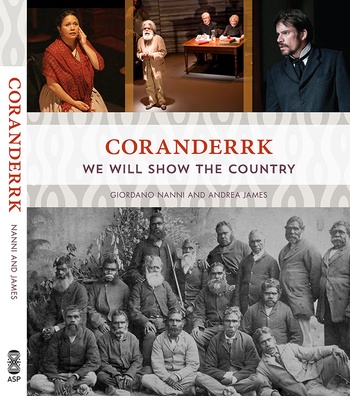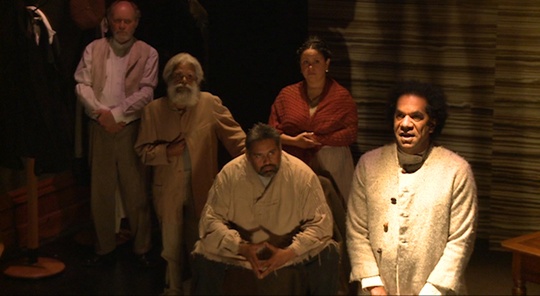Education is an important way to communicate with young people about complex historical issues and to prompt them to think about structural injustice. Through telling the story of the 1881 Parliamentary Coranderrk Inquiry and examining its local and broader significance, including through the play, Coranderrk: We Will Show The Country, the Minutes of Evidence project has supported the development of curriculum modules and teaching resources for Victorian schools.
Learning about the 1881 Coranderrk Inquiry
The Minutes of Evidence Project has sought to make the story of the 1881 Parliamentary Coranderrk Inquiry more accessible and known to the public and students through the play, Coranderrk: We Will Show The Country. By bringing together the worlds of history and theatre, the play aims to raise public awareness about Australia’s past in a new and engaging way. Audiences will be exposed to primary historical materials; to the language, ideas, opinions and policies that were once commonly adopted towards Aboriginal people; and crucially, to the voices of Aboriginal people in the nineteenth century, which are often conspicuously absent from historical records. By providing direct access to the raw materials of history, it enables audiences, whether they be adults or students, to form their own conclusions based on the evidence presented.
By helping to teach younger generations about Aboriginal and Victorian history, the Project responds to two key recommendations of the 1991 Royal Commission into Aboriginal Deaths in Custody and 1997 Bringing Them Home Reports:
- The need to educate the broader population about Aboriginal history
- The need to redress the full range of entrenched disadvantages [structural injustices] arising from that history if widespread and long term change is to take place.
Are you satisfied with Mr Harris?
— Mr Harris and Mr Green, and our station to be under the Chief Secretary; no Board at all.
Robert Wandon
minutes of evidence,
1881 Parliamentary Coranderrk Inquiry
The Inquiry is a very significant moment in Victorian history. It was a response to a series of self-determination campaigns by Aboriginal people to stay at Coranderrk and was unique for its time in receiving evidence from a broad range of witnesses – from Europeans who wanted to remove Aboriginal people from Coranderrk, from Europeans who supported Aboriginal people in staying there and governing themselves, and from Aboriginal men, women and children who were living on the reserve. The fact that 22 of the 69 witnesses were Aboriginal further demonstrates the distinctiveness of the Inquiry. The Inquiry’s transcripts therefore provide compelling evidence of collaboration, as well as conflict, between Aboriginal and non-Aboriginal people in colonial Victoria and a rich verbatim record of the nature and variety of Aboriginal and non-Aboriginal voices.
Developing an educational Curriculum and teacher resource
Social Education Victoria (SEV) has been engaged by the Department of Education and Early Childhood Development (DEECD) to develop curriculum modules for Australian Curriculum Years 9 and 10 History and Civics & Citizenship. Curriculum-
The Coranderrk Inquiry Minutes of Evidence Curriculum and Teacher Resource Package (TRP) has been trialled in 3 schools (Worawa Aboriginal College, Healesville High School and Melbourne Girls’ College) and is being developed in consultation with Indigenous community members and teachers. Recent exciting outcomes include the production of a DVD comprising individual testimonies from the 1881 Parliamentary Coranderrk Inquiry, which is designed to complement the verbatim script of Coranderrk: We Will Show The Country. Filming occurred during January 2015 at the La Mama Court House, Carlton, and involved a cast of actors delivering to-camera performances especially designed for teaching purposes and overseen by a specialist production crew. Editing and post-production has been finalised during February and early March. It is anticipated that teachers will be able to access the TRP by mid 2016 via the DEECD’s digital curriculum FUSE website.
Advisory protocols for engagement with Indigenous communities will be provided to schools offering the curriculum as part of the Teacher Resource.
Development process
- The Coranderrk Minutes of Evidence Curriculum and Teacher Resource Package project was officially launched at a successful induction day for the three trial site schools held on the 7th of November 2013 at Worawa Aboriginal College, Healesville. Welcomed to Country with a traditional smoking ceremony conducted by Aunty Lois Peeler and Elder Uncle Bill Nicholson, it was highly appropriate for participants to be starting this important curriculum project on the very site of the Coranderrk Reserve.
- In 2013 a schools workshop program was designed by ILBIJERRI Theatre Company in partnership with Healesville High School and with advice from Aunty Joy Murphy to provide an opportunity for students to identify the key stories and characters that resonate with them. At the culmination of the workshops the students created a short film which explores both the students’ response and students’ community response to the play. Community cultural development and community engagement guided these workshops.
- The induction day facilitated a fruitful preliminary discussion about the curriculum resource proposed for the trial, including the importance of engaging students and in connecting the curriculum material to personalised experiences. A range of possible resources were suggested, including source analyses, case studies of the people involved in the 1881 Inquiry, personal stories of activism, excursion ideas and ways to contextualise the curriculum in other local areas. The induction day brought together those who have been involved in the broader Minutes of Evidence project and was an opportunity for insights to be shared, as well as questions to be raised, with the trial site teachers.
- Social Education Victoria has designed the curriculum, produced resources and conducted consultations with stakeholders during 2014. The curriculum was trialled during Term 2, 2014 at three Victorian schools: Worawa Aboriginal College, Healesville High School and Melbourne Girls’ College.
- During 2014 and 2015 regular project meetings and reports between SEV, the Department of Education and Training (DET – formerly the DEECD) and the Victorian Aboriginal Education Association Incorporated (VAEAI). A Project Management Committee (PMC) has oversight of the curriculum project. PMC members are Frank Gaylard (DET) Monica Bini (VCAA), JamesFiford (SEV), Bill Nicholson (Wurundjeri Land Council), Vaso Elefsiniotis and Aunty Vera Briggs (VAEAI).
- Vaso Elefsiniotis (VAEAI), James Fiford (SEV) have recorded a series of informal interviews with VAEAI members during December 2014. These interviews are based around key themes of Land, Country, Family and Spirituality. It is hoped that these filmed discussions – to be made available in either audio or audio/visual formats (including transcripts) – will form a resource for teachers and students to allow them to better understand Aboriginal perspectives and help students make tangible connections between contemporary Aboriginal society and the historical material they encounter when studying the Coranderrk materials.
Call for Interested Schools
This will complement the proposed blog (featuring news and information related to the materials) and it is hoped that continued dialogue via a forum will facilitate the exchange of further resources and enable ongoing collaboration in this area.
To express your interest, please contact sevcoranderrkcurriculum@gmail.com with your school, a contact name and a school-based email address.
These resources will be launched through the Department of Education and Training's FUSE online portal. Schools will be advised in the lead up to the launch via the Department of Education and Training circular and subject association networks.
Resources for teachers
 In addition to the Curriculum and Teacher Resource Package, the book Coranderrk - We Will Show The Country, by historian Giordano Nanni and Yorta Yorta playwright Andrea James, is now available through Aboriginal Studies Press. (Click here for more details)
In addition to the Curriculum and Teacher Resource Package, the book Coranderrk - We Will Show The Country, by historian Giordano Nanni and Yorta Yorta playwright Andrea James, is now available through Aboriginal Studies Press. (Click here for more details)
The Minutes of Evidence project has sought to make the story of the 1881 Parliamentary Coranderrk Inquiry more accessible to the public and students through the play, Coranderrk: We Will Show The Country — "a groundbreaking theatrical performance that combines theatre and history to provide unprecedented insight into a remarkable, yet little-known chapter of Australia’s past. Its script consists entirely of the actual words spoken by Aboriginal and European men and women who testified before a nineteenth century Parliamentary Inquiry into the conditions at Coranderrk — one of six Aboriginal reserves in the colony of Victoria at that time. This book derives from that production."
